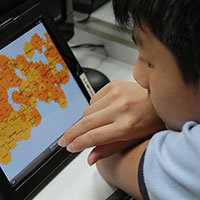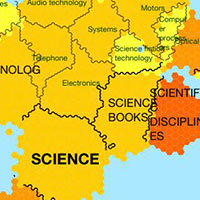Key Projects
This page lists 10 key projects in reverse chronological order. I have a strong collaboration network in Australia, China, Europe, the United States, etc. Please contact me for more information if you are interested in working or collaborating on any of these projects.

Universal “Aspect-Based Sentiment Analysis” Framework and API Development Based on Open-Sourced Large Language Models
2025-2027
Sentiment analysis, as a branch of text analytics, helps understand consumer attitudes and experiences. However, traditional sentiment analysis often only assesses the overall sentiment of a text and fails to analyse the sentiments of specific aspects. Aspect-based sentiment analysis (ABSA) addresses this issue by analysing different aspects within a text. In fields such as tourism, healthcare, and finance, ABSA helps improve service quality, enhance medical care, and assist in decision-making. This research aims to propose a general ABSA framework based on large language models, combined with interpretable AI approaches. The research findings are expected to be adaptable to multiple domains, which can support a variety of downstream applications and promote the AI+ applications in various sectors.

Survey on AI Usage among Macao High School Students
2025
The rapid development of AI technology has prompted a new round of educational reforms. To understand the current state of AI software use among high school students in Macao, our team conducted a survey from June to August 2024. A total of 6,407 students from 20 schools completed an online questionnaire to assess students’ willingness, trends, software selection, and risk perception. The survey aimed to understand students’ habits, motivations, frequency, and acceptance of using AI. This final report has published online and can be found at: https://eti.mpu.edu.mo/aisurvey/

Smart Participatory Design with Hybrid Network Framework of Behavioral Monitoring: Understanding the Use of Health-Related Short Videos among Adolescents
2024-present
This work investigates the needs of adolescents on short video platforms and engages them in the participatory design process, which is an extension of my previous work on empowering people to use the right health information to benefit themselves. Additionally, with rapid advancement in deep learning and high-resolution cameras, artificial intelligence (AI)-based algorithms are now possible to analyse users’ reactions quickly and accurately without human supervision. This project innovates the participatory design methodology by introducing an AI-based video algorithm to capture adolescents’ feedback in the participatory design process.
Key Publications

AI in Education and Education Data Mining
2022-present
This research applies AI and information technologies to improve education through the use of education data mining (EDM). EDM and AI-driven education platforms are common tools for tracking students’ performance in their learning journeys. In most cases, the platforms are used by all students and their learning activities are recorded. However, due to the differences in education systems, legal requirements and teaching approaches, EDM models and AI applications may not be fully usable depending on the context. This project is an umbrella one to explore various issues in this area and proposes both theoretical and computational solutions.
Key Publications

Fertility After Cancer Predictor (FoRECAsT)
2019-2020
This is a collaboration with Dr Michelle Peate at the University of Melbourne and others.
Breast cancer is the most frequently diagnosed cancer in reproductive aged women and many women are diagnosed before they have started or completed their families. These women then need to deal with the consequences of treatment, such as potential infertility. Thus, being able to provide women with information about how their fertility will be affected by treatment is important. This can help them to make decisions around fertility preservation prior to starting adjuvant treatment. The aim of this study is to develop an online fertility predictor targeted at young women with breast cancer. This tool will be available to women in order to inform decision making around breast cancer treatments.
Key Publications

#misCOURAGE Down Under
2017-2019
The aim of this study is to explore women’s online health-seeking behaviours at the time of miscarriage
and their views on the design and content of a website to host The Australian #misCOURAGE Campaign.
The team intends to use the information from interviews and a focus group with women who have experienced
miscarriage to develop and refine a pregnancy-related website which will ultimately provide information,
advice, support and resources for women affected by miscarriage and host The Australian
#misCOURAGE Campaign and Survey.
Key Publications

Investigating the Role of Technologies in Participant Recruitment and Engagement in Health Research
2016-2020
This study aims to investigate issues around participant recruitment and engagement in health research, and
to use technologies to improve these issues. Health research often carries out human-based studies and
clinical trials which need to recruit participants. However, do we consider the needs of the potential
participants in the process? What are their actual needs? What do they expect to get from participating a
research project? In this study, we expect to learn more about the thoughts of the participants and look for
opportunities to use latest technologies to better link researchers and participants.
Key Publications

Health Information-Seeking Behaviours
2012-2016
In this project, we try to understand how lay-people search for health information on the Internet. We have
found that people are more exploratory in different scenarios. Additionally, we have derived a model of health
information-seeking behaviours. A proof-of-concept website was developed to better support various health
information-seeking behaviours. Its source code can be found on GitHub and a sample video can be viewed here.
Key Publications

Applying Wikipedia Analysis Methodology in Teaching and the Development of Related Tools
2011-2013
This research investigates how a "map-like" visualisation can be applied in a teaching environment
with tablets (iPad). This software enables the possibility of "exploring" new knowledge in class. This
project is supported by the Science and Technology Development Fund (FDCT), Macau, China.
Key Publications

Map-like Wikipedia Visualisation
2010-2011
This project proposes a set of methods to transform the content of Wikipedia into a "map-like" visualisation. As such, people can visually perceive the relationships among Wikipedia categories and co-authoring efforts between Wikipedia articles in an intuitive way.